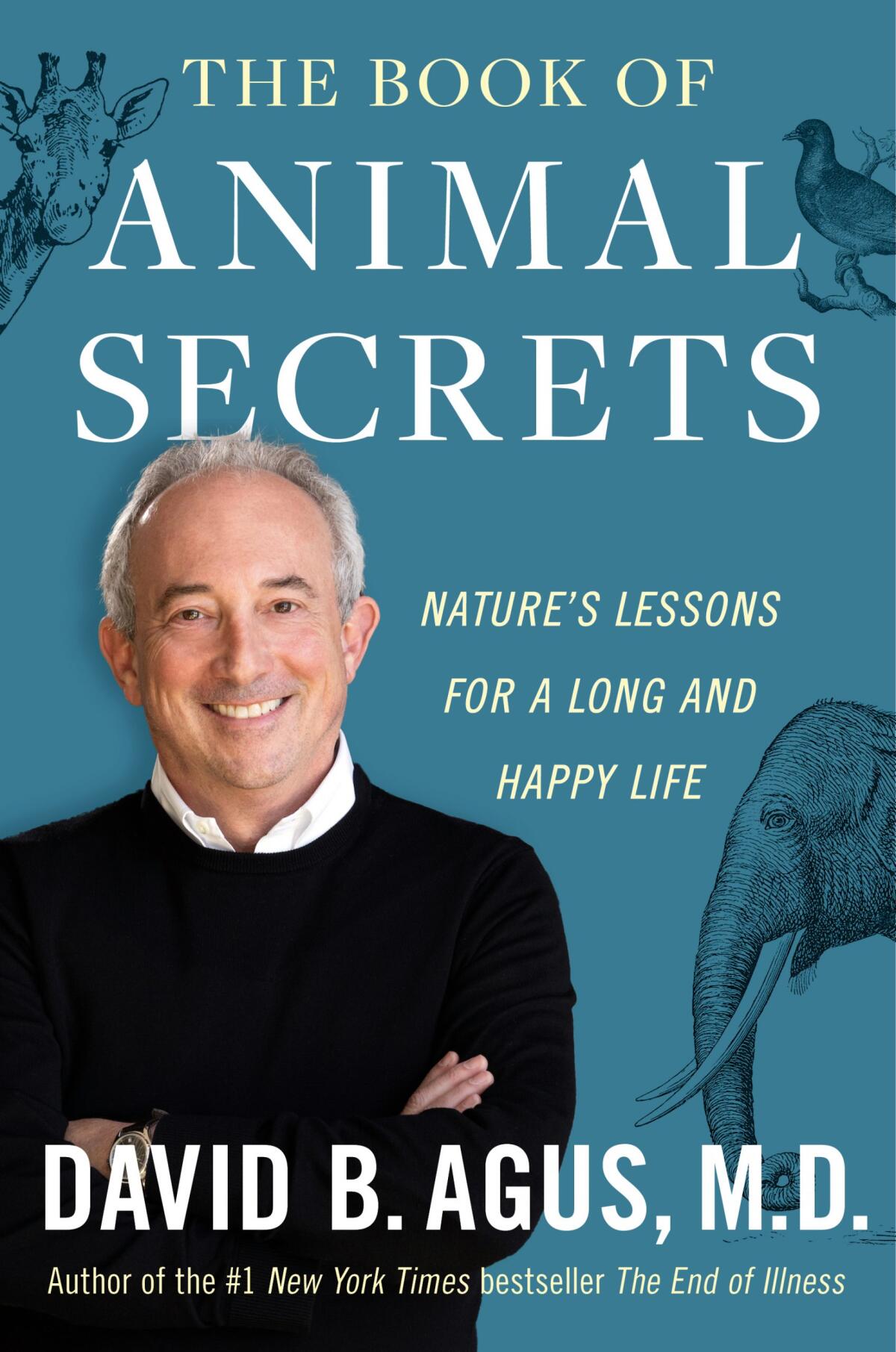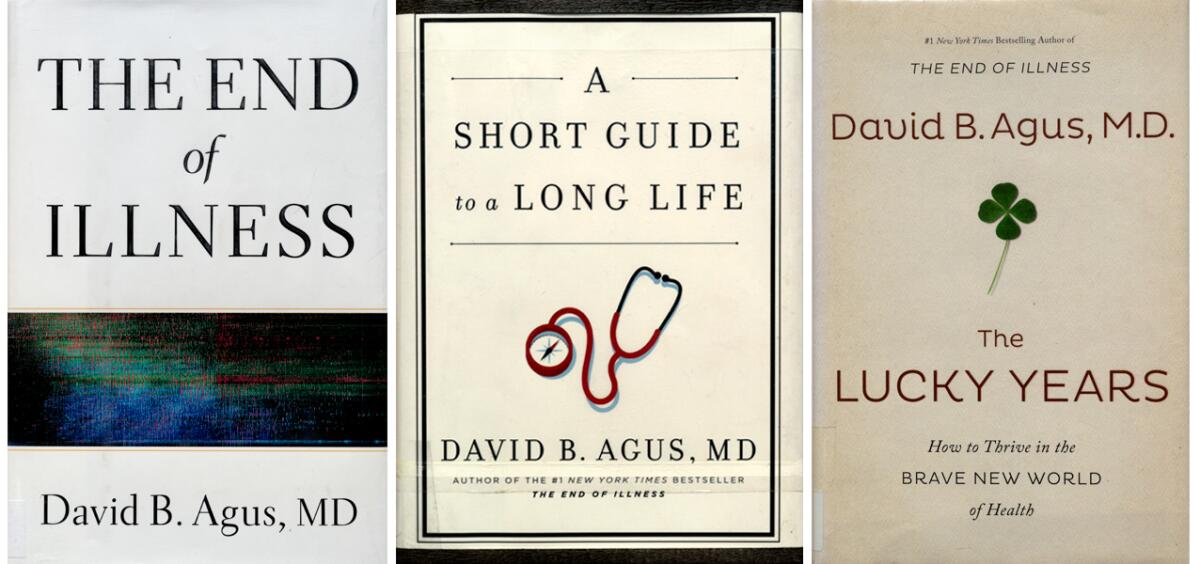Nine months after scandal, publishers are still sorting out a plagiarism mess

[ad_1]
This week, Simon & Schuster finally published “The Book of Animal Secrets: Nature’s Lessons for a Long and Happy Life,” the highly anticipated book by USC’s Dr. David Agus whose release was suspended after the manuscript was found to contain numerous instances of plagiarism.
The new version of the book differs subtly from the one originally slated for March, with multiple sections revised and reworded. But there is one conspicuous difference: the removal of a passage in the acknowledgments praising Agus’ former collaborator, Los Angeles writer Kristin Loberg.

“The Book of Animal Secrets: Nature’s Lessons for a Long and Happy Life” by Dr. David B. Agus
(Courtesy of David B. Agus M.D., Simon & Schuster)
“We have been working together for thirteen years, and I enjoy every moment we spend together,” Agus had initially penned to the person who co-wrote “The Book of Animal Secrets” and his three previous titles. “You are an amazing partner, an insightful thinker, a remarkably talented writer, and a good friend.”
Agus, an oncologist at USC’s Keck School of Medicine and chief executive of the Ellison Institute for Transformative Medicine, was not the only high-profile figure to have credited Loberg with his books’ success.
“The collaboration I have had with my partner and friend, Kristin Loberg, has been truly special,” CNN chief medical correspondent Dr. Sanjay Gupta wrote in the acknowledgments of his 2021 book “Keep Sharp: Build a Better Brain at Any Age.”
“We should all be lucky enough to have a real mind meld with someone like Kristin, who immediately understood what I was trying to convey and always helped me get there,” Gupta wrote of Loberg, who went on to produce two more volumes with him. “She is the very best at what she does, and quite simply, this book would not have been possible without her.”
For years, Loberg was a prolific and sought-after ghostwriter of health- and wellness-themed nonfiction books, a standout in the niche industry of wordsmiths who quietly craft books for authors who lack the time or experience to pen their works alone.
Between 2006 and 2022, the Los Angeles native was credited on 45 titles, nearly all released by the so-called Big Five, the handful of publishers that dominate the U.S. book industry. Books with her shared byline sold millions of copies and garnered coveted bestseller designations from Amazon and the New York Times.
Publishers often introduced her to authors seeking a writing partner, according to Loberg’s former clients and her own previous interviews.
“If the publisher, of all people, is the one doing the recommendation, that’s kind of the gold standard,” said Dan Gerstein, CEO of the agency Gotham Ghostwriters.
That changed abruptly in March. A review by The Times of Agus’ four books with Loberg found significant plagiarism: not just a recycled turn of phrase or a few missing attributions, but entire paragraphs and pages copied and pasted verbatim from blog posts, news articles and other sources.
Her two other best-selling clients, Gupta and celebrity talk show guest Dr. David Perlmutter, issued public statements saying they had reviewed their books and likewise found plagiarized material in their titles.
“I accept complete responsibility for any errors my work may have contained,” Loberg said at the time in a statement that acknowledged “allegations of plagiarism” and apologized to writers whose work was not properly credited.
Publishers pledged to review all of her books and take corrective steps where necessary. In the nine months since, they have been quietly cleaning up an editorial mess that some industry observers say is partly of their own making.

A Times investigation of books by Dr. David Agus found more than 120 passages that are virtually identical to the language and structure of previously published material from other sources.
(Los Angeles Times)
Simon & Schuster said it has released updated versions of six books by Agus and Gupta with the problematic passages either reworked or excised. Loberg’s name is scrubbed from the credits and acknowledgments in the latest editions on Amazon’s Kindle store.
Hachette Book Group released new electronic versions of the four books Perlmutter wrote with Loberg, including the bestselling “Grain Brain: The Surprising Truth About Wheat, Carbs, and Sugar — Your Brain’s Silent Killers.” Loberg’s name no longer appears in those books either.
“It seems like what they’re doing is something of a stealth new version, where they are letting corrected ones replace the ones with plagiarism relatively quietly,” said Jonathan Bailey, owner of the copyright and plagiarism consultancy CopyByte in New Orleans. “While this is much better than doing nothing, it would be much better to have first pulled the books from sale and then replaced them with clearly marked new editions.”
Representatives for Penguin Random House, HarperCollins and Macmillan did not respond to multiple queries about the outcome of promised reviews of Loberg’s books. They also declined to comment on whether they have made any changes in their editorial processes.
Neither Loberg nor her attorney responded to requests to comment for this story.
It’s unclear how plagiarism of this scale evaded notice for so long. In addition to outside sources, Loberg frequently borrowed sections from her projects with other clients. The result was a sort of ouroboros of wellness content across multiple books.
For instance, multiple passages from Dr. Michael F. Holick’s 2010 “The Vitamin D Solution: A 3-Step strategy to Cure Our Most Common Health Problem” and 2011’s “Mom Energy: A Simple Plan to Live Fully Charged” by dietitian Ashley Koff and fitness trainer Kathy Kaehler appeared in Agus’ 2012 bestseller “The End of Illness.”
Parts of “The End of Illness” surfaced the following year in Perlmutter’s “Grain Brain.” A decade later, a long passage on diabetes from “Grain Brain” appeared nearly verbatim in the original version of “The Book of Animal Secrets.”
Previous Loberg clients contacted by The Times described her as a skilled professional with a warm demeanor.
“She was super to work with and very talented,” said Dr. Carl Lavie, who collaborated with her on his 2014 book “The Obesity Paradox: When Thinner Means Sicker and Heavier Means Healthier.”
In a statement posted temporarily to her website, Loberg described the errors as inadvertent.
“I have never intentionally used another author’s work without attribution,” she wrote in the statement, which was removed after a few weeks. “The most troubling part for me is thinking and knowing I was doing everything right, only to learn that I was not as meticulous and diligent as I thought. In all my years in this profession, I’ve never once had a complaint about content.”
Yet the sheer amount of work Loberg took on during those years should have raised red flags, according to people familiar with the publishing industry. Other ghostwriters working in similar genres told The Times they tend to focus on one project at a time, frequently spending a year or more on a single book. Including the original version of Agus’ “Animal Secrets,” Loberg’s name has appeared on 46 titles since 2006.
“The original sin here was not factoring in what Loberg’s workload was,” said Gerstein of Gotham Ghostwriters. “Very, very few ghostwriters who work at that level would take on that much work for a prolonged period of time.”
The Times discovered the misappropriated material by running thee manuscripts through iThenticate, a plagiarism-detection software program used frequently by researchers, publishers and instructors.
Surprisingly, Loberg once described the same program as an essential part of her own professional process.
In a since-removed 2014 post on the Los Angeles Editors & Writers Group blog, she wrote that she had started using iThenticate the previous year, and encouraged other writers to do so “to ensure that our works are bulletproof.”
“It’s far too easy to cut and paste with good intentions during the crazy writing process and later find yourself accused of plagiarism,” Loberg wrote. “So while you might think that the secret to truly original content is just great writing, let me suggest that you add, ‘And it’s been certified organic by an anti-plagiarism program’!”
Whereas Loberg and her higher-profile clients have publicly apologized for misusing authors’ words without attribution, the companies that published the books have been largely quiet.
Given that Agus issued an apology after problems with his books came to light, “it’s not that much different a context or that hard a lift for the publishers to do the same,” Gerstein said, especially considering their role in pairing Loberg with authors.
“There was nothing in her past to indicate that she was capable of this, or this was a high risk,” he said. “But given that they did recommend her, then to make a statement of some responsibility, and to acknowledge their role in it at a minimum, wouldn’t seem that much to ask.”
The muted response from publishers is “very disheartening and disconcerting, to say the least,” said Barbara Glatt, a forensic plagiarism investigator based in Chicago.
If publishers are slow to react “even when armed with incontrovertible proof,” she said in an email, “one can only imagine that going forward with the continued advances in machine learning (ChatGPT for example) that the line between plagiarism and originality will be further blurred.”
[ad_2]


